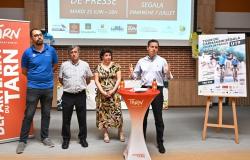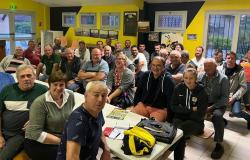Enthusiastic discussions, reunions, smiles, negotiations and trends… On June 5 and 6, blue web manufacturers and specialists in European brands who came to discover the autumn-winter 2025-2026 proposals of some 80 exhibitors met at the Superstudio Piu in Milan for the Denim Première Vision trade show. A dynamic session that attracted more than 2,000 visitors and a slew of international brands despite a complex context for the sector, affected by a slowdown in consumption in the mid- and high-end market segments.
“The particularity of the period is that the sector is not facing a single challenge. The players have little medium-term visibility which affects their strategy, estimates Fabio Adami Dalla Val, the director of the show. Inflation is a point, particularly in Germany which is the largest denim market in Europe, but tensions between China and the United States also have repercussions on activities, and the closure of the Russian market has affected several players as have logistical issues. in Asia or on the Panama Canal Without visibility, the actors seek reassurance.
In the aisles of the show, the observation is in fact that, even if visitors are interested in the latest style proposals and are looking for innovations, the 2024 financial year is complicated and caution is required.
“The year 2023 was a bubble on the market. In 2024, it’s more complicated, but we will return to pre-Covid-19 levels. I believe we are moving towards a normalization of the market, believes Paolo Biondaro, head of international accounts for the Italian specialist Elleti. What is complex is that we see that there is still demand, but that brands are waiting much longer before placing their orders. However, there is always a search for innovations and new products.”
Faced with this context, upstream players are seeking to broaden their scope, with the Italian company specializing in denim treatments seeing its customers develop sports offerings now offering the garment-dye on polyamides and develops processing solutions for accessories.
A path also explored by the Italian company FashionArt, taken over at the end of 2022 by Chanel. The company offers solutions with mixtures of materials, and also develops techniques for using denim in the creation of accessories and bags. All with a desire to bring “differentiating” novelty. On the operational side, the company bought a laundromat to optimize its response times to deliver to its customers.
On the Turkish giant Isko side, this season, the approach is to focus on the fashion applications of its developments in fabrics and cuts. It has thus segmented its offer into five concepts. “We wanted to respond to the market,” they explain on the industrialist’s stand. “We must provide a marriage between innovative technology and advanced fashion.”
While in recent years attention has been focused on eco-responsible innovations that have transformed the top of the denim industry pyramid, are we seeing a halt in this area?
During a round table bringing together the legends of the blue canvas Marithé Bachellerie, Jimmy Taverniti, Adriano Goldschmied and François Girbaud, two visions opposed each other on this point.
“New designers are totally blocked by luxury giants who monopolize every single trend. It’s impossible for them to express themselves. As for recycling, we have to stop with that. We’ve been talking about it for 40 years. But it’s not possible to recycle crap, only to have double crap. We’re heading for a brick wall. It’s up to the industry to change,” thundered François Girbaud with his legendary frankness.
A vision to which Adriano Goldschmied does not adhere: “There are many limits, but technology is changing the scenario. We must align technology and design. Digitalization offers incredible possibilities while lowering prices and allowing to move faster. The era of biotechnology opens up the possibility of moving beyond the era of oil. And recyclability allows us to reuse products, but also to create new materials. Waste is the new oil! This is the future of the industry.”
At the show, even if in the short term the discussions are commercially pragmatic, the players present who are aimed at a premium universe are therefore teeming with more responsible solutions and projects.
For the first time, Naia, the cellulose fiber from industrial giant Eastman, was present with a stand at the show with a solution specially developed for denim. A noted alternative to traditional practices in the sector… and reassuring for a part of the industry which may have been scalded in recent years by innovations which had not reached the industrial stage.
Isko, via the Re&Up solution from its house Sanko, offers brands and distributors the opportunity to recover their old textiles to create a new 100% recycled denim fabric. This is already deployed in its lines and the group has the ambition to develop other alternatives in order to reduce the use of agricultural land to obtain material.
On the Italian side, a local approach is being developed. This fall, the first harvest of Sicilian cotton from a project led by the companies Eurotessile, Berto and FashionArt will be carried out near Palermo. In order to ensure end-to-end traceability of their products, transalpine companies have decided to grow their own cotton. A responsible and above all collective approach to respond to the challenges of the industry.
All rights of reproduction and representation reserved.
© 2024 FashionNetwork.com






